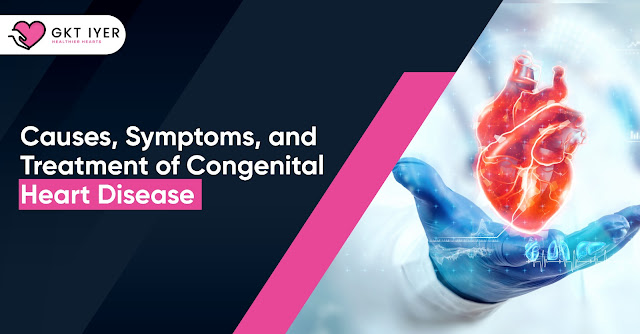Causes, Symptoms, and Treatment of Congenital Heart Disease
Congenital Heart Disease (CHD) is a condition that affects the structure and function of the heart, present from birth. It is one of the most common birth defects, impacting approximately 1% of newborns worldwide. While the exact cause of CHD is often unknown, there are several factors that contribute to its development. Understanding the causes, recognizing the symptoms, and exploring the available treatment options are crucial for early detection and effective management of this condition. In this blog, we will delve into the causes, symptoms, and treatment of congenital heart disease, shedding light on this complex condition.
Causes of Congenital Heart Disease:
Congenital Heart Disease occurs due to abnormalities in the heart's structure and function that develop during fetal growth. Although the precise cause of most cases remains unclear, certain risk factors and factors during pregnancy are associated with an increased likelihood of CHD.
Genetic Factors: In some instances, CHD can be caused by genetic abnormalities inherited from one or both parents. These genetic factors may affect the development of the heart and its blood vessels.
Environmental Factors: Exposure to certain environmental factors during pregnancy can contribute to the development of CHD. Maternal factors like smoking, alcohol or drug abuse, certain medications, and infections such as rubella, toxoplasmosis, or cytomegalovirus can increase the risk.
Chromosomal Abnormalities: Certain chromosomal disorders, such as Down syndrome, Turner syndrome, and Trisomy 13 and 18, are associated with an increased risk of congenital heart disease.
Symptoms of Congenital Heart Disease:
The symptoms of CHD can vary depending on the severity and type of the defect. Some infants may show obvious signs shortly after birth, while others may remain asymptomatic until later in life. Common symptoms of congenital heart disease include:
Cyanosis: Bluish discoloration of the skin, lips, or nails due to inadequate oxygenation of the blood.
Rapid Breathing or Shortness of Breath: Infants with CHD may exhibit rapid breathing or experience difficulty breathing during feeding or physical activity.
Poor Weight Gain: Infants with severe CHD may have difficulty feeding and fail to gain weight at a normal rate.
Fatigue or Weakness: Children with CHD may tire easily and have reduced stamina compared to their peers.
Abnormal Heart Sounds: A healthcare professional may detect abnormal heart sounds, such as murmurs or irregular rhythms, during a physical examination.
Delayed Developmental Milestones: In some cases, children with CHD may experience delays in reaching developmental milestones, such as sitting up, crawling, or walking.
It is important to note that symptoms can vary greatly depending on the specific type of congenital heart defect, and some individuals may exhibit no symptoms at all. Regular check-ups and early detection through medical examinations are crucial for identifying CHD in asymptomatic cases.
Treatment Options for Congenital Heart Disease:
The treatment of congenital heart disease depends on the type and severity of the defect. Some cases may not require immediate intervention, while others necessitate surgical or interventional procedures. Here are some common treatment options for CHD:
Medication: Certain medications can help manage symptoms, improve heart function, or prevent complications associated with CHD. These medications may include diuretics, anti-arrhythmic drugs, and medications to control blood pressure or prevent blood clots.
Catheter Procedures: Minimally invasive catheter-based interventions can be performed to repair certain congenital heart defects. This involves threading a thin tube (catheter) through blood vessels to the heart, where small devices or plugs can be placed to close abnormal openings or widen narrow blood vessels.
Surgery: In more complex cases, open-heart surgery may be necessary to repair or correct structural abnormalities in the heart. Surgical procedures can range from simple repairs to complete reconstruction of the heart and its associated blood vessels.
Heart Transplant: In severe cases where the heart is extensively damaged and cannot be repaired, a heart transplant may be considered as a last resort.
The choice of treatment depends on various factors, including the age of the patient, the specific defect, its severity, and the overall health of the individual.
Conclusion:
Congenital Heart Disease is a complex condition that requires a comprehensive understanding of its causes, symptoms, and treatment options. While the exact cause of most cases remains unknown, genetic and environmental factors play a significant role. Early detection and diagnosis are vital for implementing appropriate treatment strategies and improving long-term outcomes. With advancements in medical technology and surgical techniques, many individuals with CHD can lead healthy and fulfilling lives. However, it is essential to raise awareness, promote regular check-ups, and support ongoing research to further enhance our understanding of this condition and improve the treatment options available to those affected by congenital heart disease.


Comments
Post a Comment